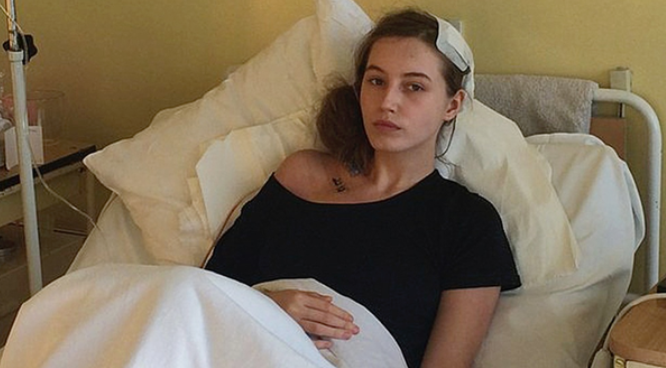What's Up, Doc? Teen Girl With Tumor Wakes Up During Brain Surgery And Chats With Doctors

The fear of dying on the operating table is not the only thing that makes patients wary about anesthesia — it’s also the fear of it wearing off during surgery. Similar to the 2007 blockbuster Awake, a teenage girl in Poland proves “anesthetic awareness” is a frightening reality. Iga Jasica, 19, shocked doctors at Central Clinical Hospital in Katowice, Poland, when she woke up with her brain exposed mid-surgery and started to talk to them.
Neurosurgeons removed the top part of her skull and were in the process of taking out parts of the cancerous tumor when she suddenly woke up. "I can’t remember much, but the doctor said he talked to me about cats, which I love. I missed Christmas because of this operation, but it is the best present I could have had, as I am now feeling great," Jasica told the Mirror.
Doctors believe it is possible the brain surgery caused neurons to trigger, which may have helped Jasica regain consciousness and the ability to speak. However, medics are currently investigating whether the anesthetic may have been improperly administered. "Despite coming round, she didn’t feel anything and was never in danger," neurosurgeon Dawid Larysz told the Mirror.
The incidence rate for awareness under general anesthesia is about one in every 19,000 cases, according to a NAP5 report published in the journal Anesthesia. The average episode of anesthesia awareness is relatively brief and not always clear. The study found most episodes last less than five minutes, while in 34 percent of the cases the duration was estimated to be less than one minute. However, in most cases unlike Jasica’s, patients regain consciousness, but not the ability to verbally communicate.
'How's it going?': Teenager wakes up during brain surgery and asks doctors for progress report http://t.co/q0IX80ocl6 pic.twitter.com/ogeWR7I1Tp
— Daily Mirror (@DailyMirror) January 2, 2015In 1990, Jeanette Liska, author of Silenced Screams, Surviving Anesthetic Awareness During Surgery: A True-life Account, lived every surgical patient’s nightmare: lying paralyzed from anesthetics while awake on the operating table with no means of communication. The pain medications she received from her anesthesiologist were no longer working, and she consequently endured terrible pain and fear for more than two hours. "Writing about my experience with anesthetic awareness has allowed me to take a horrifying experience and affect the lives of others positively," Liska said.
Anesthesia awareness is rare but preventable — to a certain degree. Doctors and nurses can administer more anesthesia to avoid anesthesia awareness. However, the danger lies in its potential complications, like excessive sleepiness to heart attacks, says the Mayo Clinic.
There are devices that can clue in doctors about the effectiveness of anesthesia regarding their patients. Devices such as the bispectral index (BIS) monitor measures a patient’s brain waves when they’re under anesthesia to let doctors know how out of it the patient is. The device hasn’t been proven to actually prevent anesthesia awareness, but it help increase patient monitoring.
The likelihood of anesthesia awareness increases during emergency surgery, cesarean surgery, depression, or errors by the anesthesiologist, such as not monitoring the patient or measuring the amount of anesthesia in the patient’s system throughout the procedure.



























